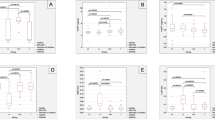Abstract
THE discovery of citric acid in mammalian semen is due to Scherstén1,2, who was also the first to point out that the acid originates in the accessory glands of reproduction, chiefly the seminal vesicles. In this respect citric acid resembles another more recently discovered component of semen, namely, fructose3, which has similarly been shown to be secreted mainly in the seminal vesicles4,5. The present study was undertaken primarily with the view of investigating the possibility that there may exist a link between the two substances with regard to their formation, distribution or function in reproductive organs and semen. Citric acid was estimated colorimetrically6,7. The results were briefly as follows.
This is a preview of subscription content, access via your institution
Access options
Subscribe to this journal
Receive 51 print issues and online access
$199.00 per year
only $3.90 per issue
Buy this article
- Purchase on Springer Link
- Instant access to full article PDF
Prices may be subject to local taxes which are calculated during checkout
Similar content being viewed by others
References
Scherstén, B., Skand. Arch. Physiol, 58, 90 (1929).
Seherstsén, B., Skand. Arch. Physiol, 74, suppl. 7 (1936).
Mann, T., Nature, 157, 79 (1946).
Mann, T., Biochem. J., 40, xxix (1946).
Mann, T., Biochem. J., 40, 481 (1946).
Pucher, G. W., Sherman, C. C., and Vickery, H. B., J. Biol. Chem., 113, 235 (1936).
Krebs, H. A., and Eggleston, L. V., Biochem. J., 38, 426 (1944).
Davies, D. V., and Mann, T., Nature, 160, 295 (1947).
Mann, T., and Parsons, U., Nature, 160, 294 (1947).
Mann, T., Lancet (in the press).
Lardy, H. A., and Phillips, P. H., Arch. Biochem., 6, 53 (1945).
Author information
Authors and Affiliations
Rights and permissions
About this article
Cite this article
HUMPHREY, G., MANN, T. Citric Acid in Semen. Nature 161, 352–353 (1948). https://doi.org/10.1038/161352a0
Issue Date:
DOI: https://doi.org/10.1038/161352a0
This article is cited by
-
Effect of castration and androgen treatment on the androgen dependent parameters in the accessory glands of the slender loris,loris Tardigradus lydekkerianus (Cabra)
Proceedings: Animal Sciences (1985)
-
Subcellular distribution of zinc in rat prostate studied by X-ray microanalysis. I. Normal prostate
The Histochemical Journal (1977)
-
Citric acid contents in the ejaculate, significance of its determination in andrological diagnostics
International Urology and Nephrology (1975)
-
Bestimmung der Citronens�ure bei M�nnern mit Fertilit�tsst�rungen
Archiv f�r Klinische und Experimentelle Dermatologie (1961)
-
Urinary Excretion of Œstrogens in Cases of Chronic Prostato-vesiculitis
Nature (1960)
Comments
By submitting a comment you agree to abide by our Terms and Community Guidelines. If you find something abusive or that does not comply with our terms or guidelines please flag it as inappropriate.


